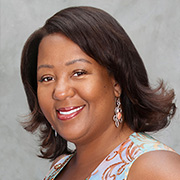
Janet Crenshaw Smith
Co-Founder & President
Education: BA, Harvard University
Company Name: Ivy Planning Group
Industry: Consulting
Company Headquarters Location: Bethesda, Maryland
Number of Employees: N/A
Words you live by: Pray. Believe. Receive.
Who is your personal hero? My mother and father
What book are you reading? A Promised Land by Barack Obama
What was your first job? Data entry at Marshall Field’s department store
Favorite charity: Florida Avenue Baptist Church Robert L. Rollins Memorial Scholarship Fund
Interests: Spa, spa, spa!
Family: Married for 36 years, with 3 adult sons
Boldly Black
The pandemic has taken a horrible toll on everyone and on Black people in particular. Even as we live through this difficult time, I also see that some good has emerged. More Black people have become more boldly Black.
What do I mean by boldly Black? Speaking for Black without dilution. Speaking up about being Black with less fear of the consequences.
Speaking for Black without dilution. I define diversity broadly. Diversity means all kinds of differences that matter so much that they impact behaviors, actions, and decisions. That includes race, gender, gender identity, sexual orientation, abilities/disabilities, religion, education, socioeconomic status, political affiliations, language, thought, and much more.
For decades, when I offered that broad definition, there was one thing I could count on: One of the first people to say, “What we really want is diversity of thought” would be a person of color. And often that person of color was Black. Early in my career that pattern frustrated and angered me. Later in my career, as I gained more insight into why it happens, it still frustrated and saddened me. Interestingly enough, since May 2020, that statement rarely comes out of the mouth of a Black person. Perhaps because “zooming in” on race has become more understood and accepted by people. We zoom in on a particular dimension of diversity when we understand a particular need. It doesn’t mean that zooming out on diversity broadly is no longer important. It means that given limited resources, efforts to address the realities of Black inequities cannot be diluted by thinly spreading those limited resources.
Speaking up about being Black with less fear of the consequences. The very public killing of George Floyd on May 25, 2020, vividly revealed the truth of the senseless killing of Black people. But something else happened. Black people also spoke up in corporate settings. I watched the most senior-level Black people in scores of organizations talk about their personal experiences of racial discrimination. That was new. We learned that some people, many people, thought only “certain kinds of Black people” experienced racial inequities. And certainly, not Black people in THEIR organizations. The boldness of Black people at all levels in organizations to speak up and share their experiences has changed everything. It has made things more real for everyone.
Being Boldly Black isn’t all that bold after all is it? If we care about our organizations, communities, nation, and world, then of course we will zoom in on the greatest needs. It’s what we do. We fix what needs to be fixed. If we see something, then we say something. Here’s to making it the new norm.






